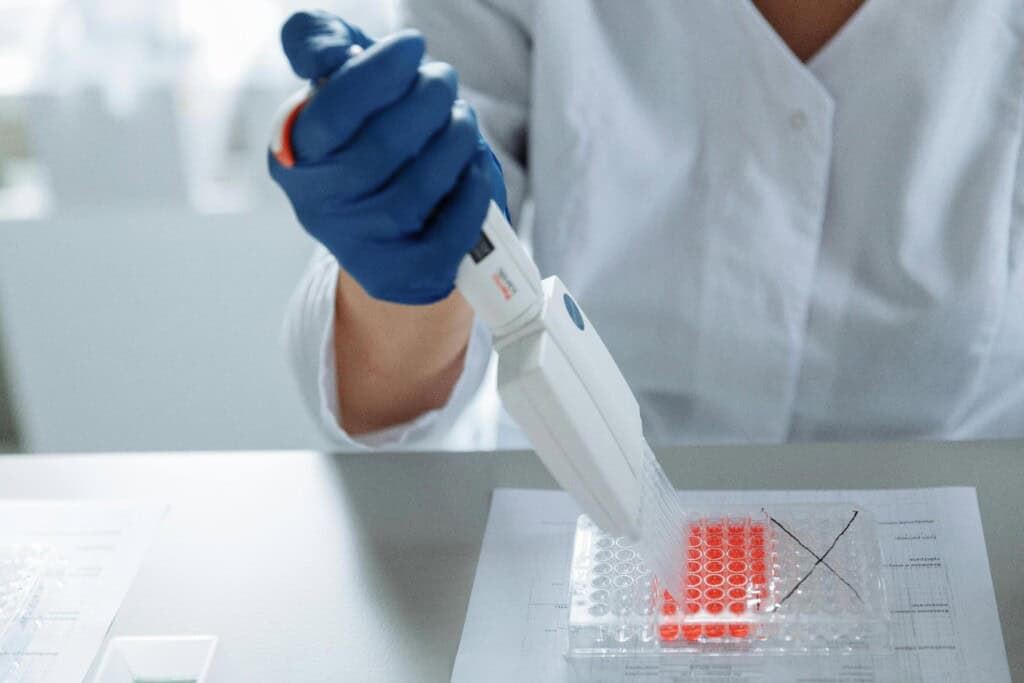
Source: https://www.pexels.com/photo/close-up-of-a-lab-worker-distributing-medication-into-capsules-8940471/
Genetics: the big DNA puzzle that defines us. It’s like the ultimate playbook, but complete with typos and scribbles that make it unique for each one of us. When it comes to medication, these tiny “typos” hold the power to decide if your pill is a boon or a bane. Understanding your DNA can cut through the guesswork like a student with crib notes. It’s not crystal ball science; it’s more about knowing your odds in this game of genetics.
Exploring DNA’s Role in Medication
Race cars need specific fuel. Similarly, different people need different doses and types of medication. DNA testing can provide insights into this custom fuel mix. For example, a single change in the genetic code can mean that one person metabolizes a drug at lightning speed, while another processes it like a snail stuck in molasses. If ever there was a need for a personalized medicine mantra, DNA insights would be it.
Pharmacogenetics, the cool kid in class, is helping doctors make better predictions about how drugs will interact with your unique biological makeup. It’s like knowing whether you’re playing with a deck that’s rigged in your favor – or not.
Time and again, clinical studies reveal surprises about specific drug interactions with different genetic markers. These discoveries, although initially complex to understand, pave the way for medication that takes individual differences truly into account, redefining care protocols at large. It underscores a need to move from generalized prescriptions towards smarter medical interventions molded to the DNA detail.
Pharmacogenetic testing offers a tailored approach to medication. This method enhances treatment efficacy and reduces the likelihood of adverse reactions by adapting to each person’s unique genetic framework. It’s about time medicine starts to reflect the intricate diversity of our DNA.
The implementation of genetic insights into daily medical practice also hinges on the collaboration between the scientific community, healthcare providers, and patients. By working together, these groups can ensure people receive treatments tailored to their unique biochemical makeup, rather than relying on a standard dose calculator without context. Continual education is vital to fostering such collaboration.
Genetic Testing: The New Frontier of Health Care?
Ask any hypochondriac: playing doctor is a hobby best enacted with some guidance. Genetic testing is the punch line to this over-anxious joke. Doctors have been fumbling around with trial and error for way too long. Thanks to DNA, they can now be less Watson and more Sherlock. Personalized medicine could save drowning patients from the tidal wave of trial-and-error treatments.
Want to know if that painkiller will relieve pain or twist you in knots of agony? Your DNA might be holding that golden ticket. Just consider it a clue in the medical game of Clue.
The affordability and accessibility of genetic testing present dual challenges and opportunities. While interest grows, there’s a fundamental need to address cost barriers and educate potential users on the benefits of such tests. Awareness about ethical considerations around data usage and privacy is imperative to protect individuals while advancing this field of medicine.
What’s at Stake?
Understand this: medication comes with risks. Not everybody feels the endless sunshine of drug safety. Adverse drug reactions are more common than a laptop with a cracked screen – ubiquitous and frustrating. DNA can shine a light in that frustrating gloom. Instead of crossing your fingers each time you pop a pill, crafting a treatment based on your genetic backdrop could eliminate those dicey moments.
In the end, it’s all about avoiding “Uh-ohs” before they fire up. After all, wouldn’t it be a comforting thought if the medicine cabinet didn’t have to resemble a field test?
The Future Is All About You
It’s like having a cheat sheet from your cells. As scientists decode more and more genetic information, we are stepping closer to being bosses of our health destinies. The clearer this genetic crystal ball becomes, the more we’ll be able to predict what makes our bodies tick and tock (and sometimes hiccup).
You’re not at the whim of pharmaceutical dice rolls anymore. Harnessing the future of pharmacogenetics could spell the end of “one-size-fits-some” medicine. Because, let’s face it: when it comes to health, who wants the hand-me-down version?
Looking ahead, we see a continuous unfolding of possibilities, where healthcare is not merely a reaction to symptoms but a proactive tailoring of care. The ambition is to marshal genetic data into actionable medical frameworks that improve patient outcomes—connecting dots between the ancestral language of our genes and modern medication precisely.
Takeaways
The road to personalized medication could hand us the keys to better health without all the U-turns. DNA is more than just three letters; it’s the roadmap to understanding you. As the potential for more genetic insights grows, maybe we’ll start finding that the best treatment for you is indeed just that – the best treatment for you. Just remember, in this crazy, beautiful mess of biology and medicine, it’s our genes that call the shots. But with DNA insights, we’re finally learning to read their playbook.
